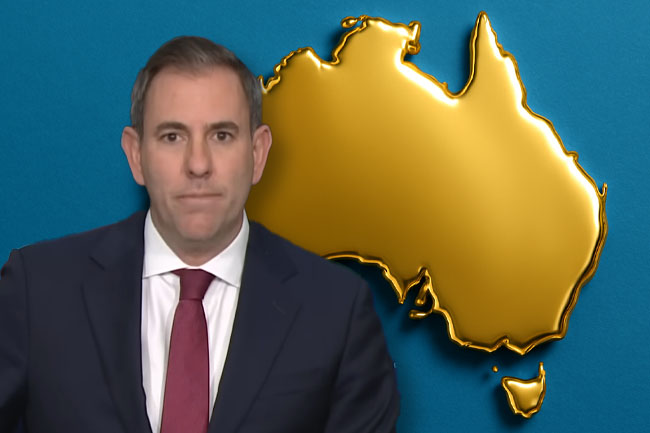Global export figures show which countries are handling current economic conditions well and those which aren’t. Australia is among the losers, along with Britain and the USA, writes Alan Austin.
FOR THE LAST 15 months and counting, exports from the U.S. have been below the values of the equivalent month three years earlier.
This has not happened before in the 70 years since the USA has kept trade records. As far as we can tell, this has never happened in any other developed country.
This is the stark outcome of former U.S. President Donald Trump’s appalling decision to impose tariffs unilaterally on imports from trading partners.
Trump’s tariffs fiasco
Exports normally rise gradually month on month as populations increase, economies grow and inflation takes effect. So with sound trade management, each month’s exports should be higher than for the same month in all previous years, with occasional blips and variations, of course.
Disastrous decisions, however, do enormous damage, as Trump demonstrated with his tariffs on a range of imported goods announced in May 2018. Exports have now been below the May 2018 level in every single month since.
It may take years to get back to the trade position Trump inherited. It may take decades to recover the losses incurred over that period. The thousands of farmer suicides during Trump’s rural recession will, of course, never be reversed.
The blue chart, above, depicts the change in export values over the three years from the first quarter in 2018 to the first quarter of 2021 which ended in March. This shows all 34 advanced economies, with a population above one million.
Clearly, well-managed economies fared well, with Lithuania, Hungary, Slovenia, Ireland, Poland and Turkey all increasing their exports by an average of 7% per year over the last three years. It was certainly not inevitable that the pandemic would cause havoc with trade. These countries prove exports can be increased with skill, innovation and sound diplomacy.
Another 22 countries increased exports by lesser percentages, while six countries went backwards — three of them significantly.
Outcomes in normal times
The green graph below shows what usually happens in times free of global crises. During the three years from 2015 to 2018, all advanced economies increased exports. The average was a healthy 4.8% per year or 15.2% over three years.
Repercussions of Britain’s Brexit
The worst collapse in exports over the last three years has been in the United Kingdom following the decision to leave the European Union (EU) which took effect in January 2020. The UK now has 27 neighbours who are vigorous trade competitors, after 47 years of obligatory trade collaboration.
It is too early to predict if or when the UK will recover the buoyant export values it enjoyed in the years leading up to its split with the EU. The last three months have looked reasonably positive, with values up nearly 10% on the same month last year. They remain, however, 10% below those months in 2019.
Australia fell down the rankings
Australia has copped one of the worst declines in global rankings over the last couple of years, though not quite as bad as the UK or Finland.
Australia ranked second through that period of booming export volumes and soaring commodity prices illustrated in the green chart, above. In fact, Australia has been among the global leaders ever since trade with China opened in the early 1970s — until the last two years of the Coalition Government.
The recent dramatic collapse in trade performance appears due to three causes.
First, the Morrison Government’s monumental incompetence in mismanaging the relationship with China, Australia’s largest trading partner by far. Second, failure to expand current exports to new markets. And third, the inability to develop new export industries — despite the plethora of possibilities.
The Morrison Government foolishly followed Donald Trump’s ill-advised attacks on China for its alleged failures in managing the coronavirus. This sealed Australia’s fate. China retaliated – as was predictable – by imposing tariffs on barley and fine wines, suspending permits for beef supplied by Australian abattoirs, stopping coal imports and banning live lobster imports.
Australia held in contempt
These decisions have greatly harmed local producers while giving a great boost to Australia’s competitors. China has not been disadvantaged at all.
According to former diplomat Bruce Haigh, China now holds the Morrison Government in contempt for its incompetence, ignorance and industrial-scale corruption.
Australia’s trade performance has been hampered by having had a succession of failures as trade ministers since 2013. Four Liberal ministers have tried the job – Andrew Robb, Steve Ciobo, Simon Birmingham and Dan Tehan – each less competent than his predecessor. Not one can claim significant success.
Thus Australia has collapsed down the global rankings on trade as it has on all other measures of sound economic management.
There is no excuse for this. Commodity prices are at record highs. The world still consumes Australia’s produce in vast quantities. And there are countless new industries Australia could exploit if it had the competence and the motivation. The Morrison Government has neither.
Alan Austin’s defamation matter is nearly over. You can read the latest update here and contribute to the crowd-funding campaign HERE. Alan Austin is an Independent Australia columnist and freelance journalist. You can follow him on Twitter @alanaustin001.
Related Articles
- How to build a strong Australian economy — swap Scott for Jacinda
- Democracy under attack
- Robodebt and other Morrison Government abuses: That's who we are now
- The Bureau of Statistics misleads Australians on the economy
- ALAN AUSTIN: Job participation rate highlights burden on seniors and students
 This work is licensed under a Creative Commons Attribution-NonCommercial-NoDerivs 3.0 Australia License
This work is licensed under a Creative Commons Attribution-NonCommercial-NoDerivs 3.0 Australia License
Support independent journalism Subscribe to IA.















